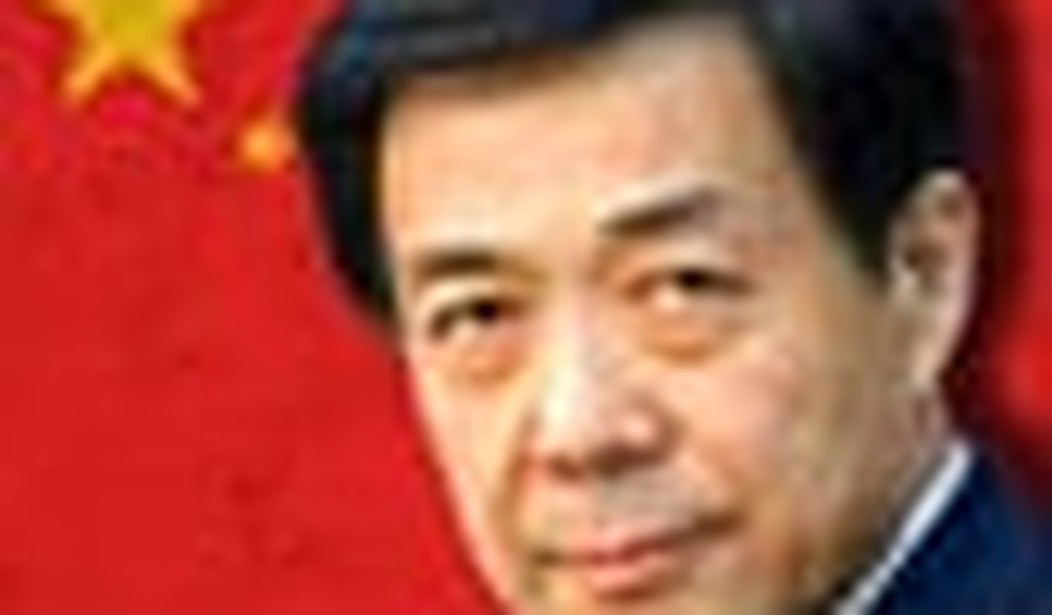A defiant Bo Xilai is contesting charges in China’s “trial of the century,” which started this week in the Intermediate People’s Court in Jinan, the capital of eastern Shandong province. He said he had been forced to confess during interrogation and retracted his admissions of guilt.
Once China’s most charismatic and openly ambitious official, Bo faces years of imprisonment for bribery, embezzlement, and abuse of power. He was detained in March of last year and formally charged late last month. His trial date, announced on the 18th, was apparently set at the just-concluded leadership conclave at the Beidaihe resort. The repeated delays in finally disposing of his case — he was expected to be convicted and sentenced last October — are undoubtedly the result of intense bargaining among factions in the ruling Communist Party.
Mr. Bo is thought to have some connection to the murder of British businessman Neil Heywood in November 2011, a deed to which Bo’s wife pled guilty and was given a suspended death sentence last August. Rumors say he will be incarcerated in comfortable surroundings for a long stretch, that there will be no further prosecution of his family, and that there will be little or no restitution.
His fate, when it is announced, should reveal Beijing’s current balance of power. A lenient sentence will be an indication that the Party’s regressive elements are ascendant. They rushed to support Bo when, as Chongqing’s Party chief, he sponsored populist and Maoist-themed campaigns that shook the Chinese political system.
Many argue that Bo’s conviction will mark a turning point in China’s turbulent politics. The general consensus among China watchers is that, once the court pronounces its sentence, Chinese leader Xi Jinping will be able to begin governing in earnest, breaking the paralysis in Beijing.
For instance, many predict the leadership will announce structural economic reforms at the Party’s Third Plenum, which could take place in October. Similarly, China watchers expect to see signs that Xi has consolidated his grip on the Party machinery and the People’s Liberation Army, which reports directly to him in his role as chairman of the Party’s Central Military Commission.
This narrative may not be correct, however. The divisions in the Party and society that delayed Bo Xilai’s sentencing remain, and in some ways may be worsening. The trial, although it will render the Party’s final — for now — political verdict on Bo, will do nothing to end the infighting as to what to do with deteriorating growth.
China’s economy is growing, but not nearly at the 7.5% rate claimed by the National Bureau of Statistics. Inadequate adjustments for inflation and substantial overstatement of industrial output, among other maladies, suggest growth is really in the low single digits, well off the double-digit pace seen as recently as 2010.
Economic problems have appeared to sharpen political divisions, something evident in Beijing’s on-again, off-again censorship of Finance Minister Lou Jiwei’s admission last month that China would experience sub-target growth in the second half of this year. Permitting slower growth is considered crucial for reform, so the censorship has been taken as a bad sign. Xi Jinping’s reformist premier, Li Keqiang, wants to implement sweeping changes to get China moving again but has been stymied by the so-called Iron Quadrangle of entrenched interests, many of them Bo supporters.
As growth continues to erode, the divide between those wanting structural reform and others believing in state-directed solutions can only widen, as it appears to have done so in recent months. Worryingly, China’s internal squabbling looks like it is affecting the country’s external relations. Xi’s aggressive maneuvers to grab territory — especially from India, Japan, and the Philippines — are attempts to direct public discontent away from the faltering political system.
The settlement of Bo’s future does nothing to address that discontent, which manifests itself in the evident displeasure with the current rock-no-boat politics. Bo’s incarceration will also do nothing to end signs of defiance of authority, including increasingly noisy street protest. His sentencing could mean that Xi Jinping may have to move even further “left” to repair his relations with Bo’s extremist supporters. Already, China is in the midst of Xi’s Maoist and Marxist campaigns that highlight, once again, the anti-modern nature of Chinese communist politics.
Xi, who has no identifiable political faction of his own, will have to navigate among the Party’s partisans. If anything, that means he will not be able to undertake the bold initiatives expected when he became general secretary last November. There were also high hopes that his predecessor, Hu Jintao, would also sponsor liberalization when he came to power in 2002. His ten-year tenure is now called the “Lost Decade.”
Soon, Bo Xilai will be out of the way, and Xi’s real test will begin. Perhaps the controversial Bo has stood in Xi’s way, but it’s more likely that the one-party state has been the real impediment to positive change.









Join the conversation as a VIP Member